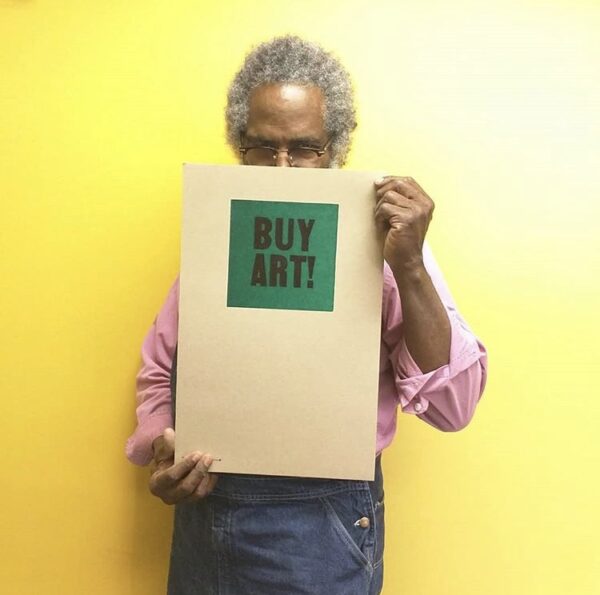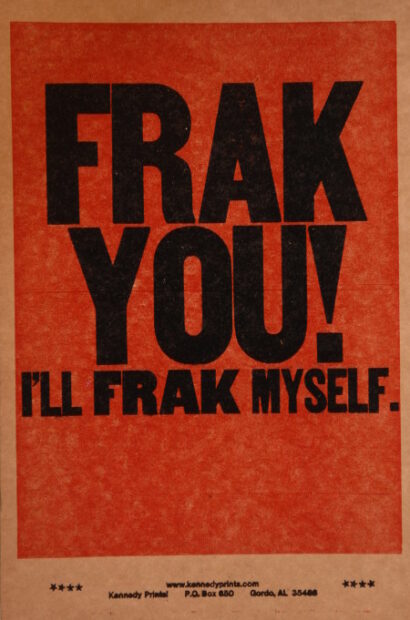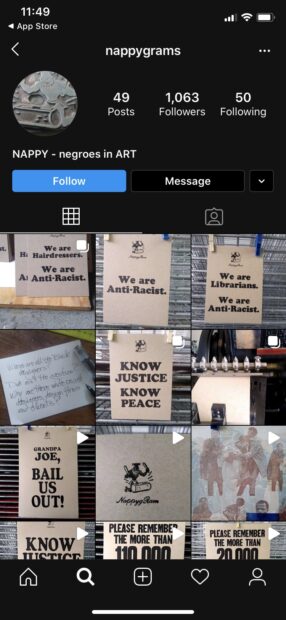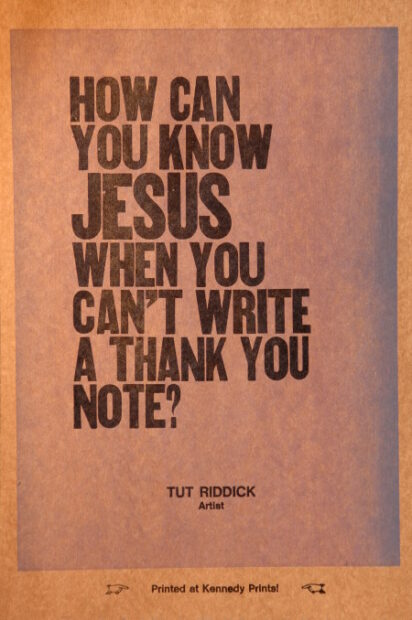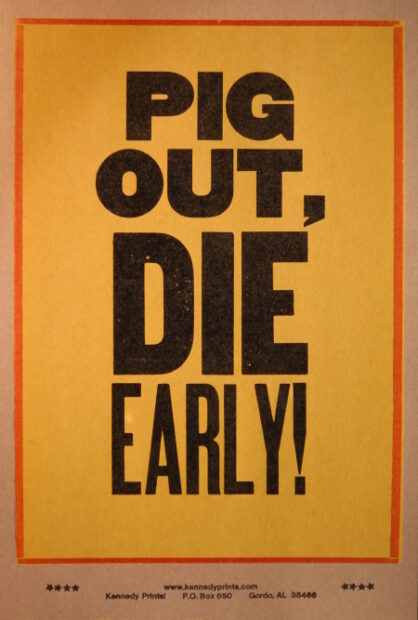Note: Below is an interview with letterpress printer Amos Paul Kennedy Jr. (edited for length and clarity), who is based in Detroit, conducted by Hannah Dean. Kennedy is the juror for CASPFEST 2020 at the Charles Adams Studio Projects, on view October 17th at 5&J Gallery in Lubbock. (The exhibition will also be virtually accessible.)
Kennedy’s letterpress printmaking reflects contemporary social concerns: community health, power, race, and identity. A systems analyst for AT&T until he was 40, Kennedy earned his MFA in Graphic Design from the University of Wisconsin-Madison in 1997. In 2015 Kennedy was named a United States Artist Glasgow Fellow, and continues to lecture and teach around the world. For more about Kennedy, please visit the documentary Proceed and Be Bold! available on YouTube.
Hannah Dean: Is it okay if I record our conversation?
Amos Paul Kennedy Jr.: You can’t write that fast? [laughter]
HD: What is the role of tension in your work? I was going to say humor.
APKJ: I don’t look at it as tension, I just print what I want to print. You know, if there is a cutting edge, it is with a dull knife — it takes a long time to cut. I see the world that I live in and this is my reaction to it. There is humor in my work. Things operate on different planes. One thing would be my Nappygrams. When you look at those, there is no ambiguity. No subtlety at all. It’s more of a slap in the face. Sometimes, I’m printing the world as I see it, or the world as I want it to be.
HD: Are you still sending the Nappygrams?
APKJ: Oh yes, I have; I’ve started them again. Mostly I’m putting those on an Instagram account. Sometimes people ask if they can buy them, and then we start a dialogue. Often, if they want to buy it I don’t sell; I have them send a contribution to an organization: the library funding for Grambling State University in Louisiana. The fund is used for students in case of emergencies. Historically, Black universities are underfunded and do not garner the attention they deserve for what they provide for civilization.
HD: When you speak of building a new civilization [in your posters, or on Instagram], what does that look like for you? Do you see that happening here [in the United States]?
APKJ: It looks like the older civilizations that we used to have. A civilization based on mutual aid, and respect of the common man, where people actively engage in their governance. It’s a civilization that would require a lot of energy out of its citizens. I see it happening after the fall of capitalism.
HD: I love the way you title your exhibitions. Even the preface on your website is: “We demand the very best from our clients!” What would you call this new civilization?
APKJ: It is The Age of Humanity.
HD: As documented in Proceed and Be Bold! you’ve made several moves. What is gained in this kind of mobility? What, if anything, is lost?
APKJ: What was gained was being able to print without having to worry about rent. Each time I moved, I was going somewhere without the burden of monthly rent over my head. Those opportunities afforded me a humongous amount of freedom. That is still the largest debt people have.
HD: Maybe school debt, too.
APKJ: I think it is going to run a close second. Yes, school debt is one of those “longevity” debts, like rent. Most of the time your debt is a car, utilities, maybe a credit card you run up.
HD: You’re currently in Detroit. What is that like?
APKJ: [laughter] It’s horrible. Don’t come here. You’re trying to get me to say nice things about Detroit and then people will spoil it and move here! IT’S HORRIBLE. DON’T COME HERE!
It’s an interesting city. It has a whole lotta green space, and I think that is really nice. It is a city that at one time, I would tell students: If you get out of school and don’t have debt, and you ask your parents to send you to Europe for a year, don’t. Say give me the money and then go to Detroit and buy a house and make stuff. Because, if you don’t have rent, how much money do you need? Work 20 hours a week, and then spend the rest of your time making stuff. My apartment probably costs the same as one in Lubbock, Texas. Maybe cheaper.
HD: Have you been in Detroit throughout the [Covid-19] pandemic?
APKJ: Yes, I have.
HD:What has this year been like for you, with the pandemic, protests, etc.?
APKJ: In regards to the pandemic: it is a sign of our coming future. The pandemic did not spring up instantaneously in 2020. Events that we have put in place in the last decades — no, last centuries — allowed this to develop. What we must realize is that this is maybe as good as it gets, as bad is it is. We do not have a rosy future based on what we humans have done to the environment, and that we continue to do. That is the big thing about the pandemic.
The social unrest that was demonstrated, I think, partially — the pandemic had so many people with free time. They didn’t have a job that was pulling the curtains over their eyes, so they [could] pay attention every day. They are finding that they are basically in the same ship as black people are — they are being abused, being used by the system, and being cast aside.
“Die for the system” is what they told you. People realize it. “The system ain’t dying for me, why should I die for the system?” And so they want to see a change, so this mobilization allowed the masses to develop and cultivate a culture of their own, not one handed down to them by a tiny minority.
HD: Has 2020 (socially distancing; closures) changed the day-to-day aspects of your life?
APKJ: It’s very different. I usually travel and am visiting universities for workshops once a month. With Covid, all that went away. In some respects I’m enjoying the lack of travel. It affords me time to do what I should have been doing. I mean, it wasn’t a serious loss — just filing papers and the like.
HD: How many hours do you spend printing a day?
APKJ: Actively printing? I’m not sure. But I spend at least nine hours a day in the print shop with upkeep and design. It’s a lot of pulling open cases, trying out types. The shop is about two miles away from [where I live.] It’s actually a storage location. I would say 60% of my equipment and supplies are boxed up because I did not plan to be there as long as I have been there. But next year I’m moving to where my “forever” shop will be — four blocks from where I live!
HD: Is Detroit your forever home, then?
APKJ: Yes, plan to die here… .The space, inexpensiveness, drew me here, as well as the fact there is a hub airport. You can fly anywhere without having to change planes five or six times. It’s within 12 hours from most of the East Coast, as well as Nashville, or a little shy of St. Louis. For a location east of the Mississippi you can come in contact with a lot of cities. Everybody has to die someplace. I’m just choosing the place where I die.
HD: What is on the horizon for you?
APKJ: I’m very excited about the new space, my forever shop. I’m hopefully moving in June of 2021. Then I get to finally unbox the stuff I’ve got in storage.
HD: What would you want to say to artists just starting out, or young people in general?
APKJ: What are their interests? People need to realize that paramount in their life is that they find what makes them happy. We are taught that is not necessarily the best course of action to take. I believe that if you pursue something you absolutely enjoy that you will find you have a contentment, a peace in your life. You may not own the fanciest house, a car — those things won’t make a difference then. Society says they do. What is important to you, you will have. Instead, strive for a calmness, a peace in your life… . Every day try to be more human, and less of a consumer.
Make stuff every day. Keep your expectations low! Expectations have a tendency to kill you. It ruins the process. Put ink on paper — which is a low bar. If I do that, I get a sense of accomplishment. It helps me lose my frustration or feeling of incompetence. If I intend to make the most beautiful book, [I will fail.] If my intent is to simply put ink on paper, a beautiful book will come. You are raised to have high expectations. Do it because you like to do it.
I really like to print, so everything else is just icing on the cake.


